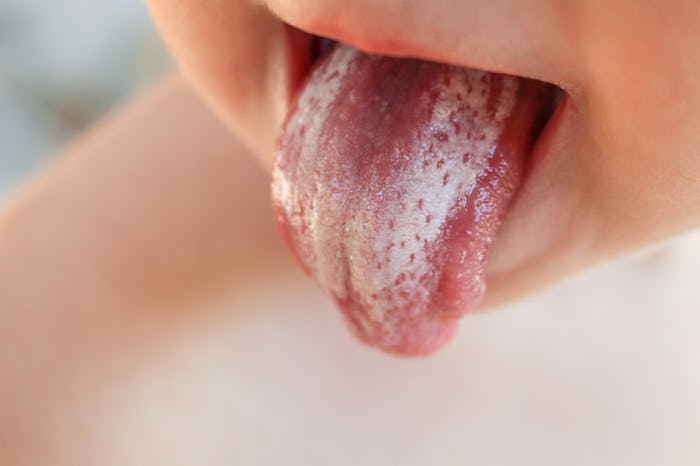Life

Why Do Babies Get Thrush? Don’t Worry — It’s Not As Bad As You Think
Although you want your baby to be healthy all the time, sickness happens. It’s especially frustrating in infants, because they can’t tell you what is wrong, so you and your physician are left to guess. Fortunately, some illnesses are easier to spot than others, and thrush is one condition that is easy to identify. Of course, given that thrush is the result of a yeast infection, you may be wondering why babies get thrush in the first place.
First, you should know that thrush is not a cause for panic. Yes, the white spots around your child’s mouth may not be ideal, but thrush is a very common affliction for infants. According to Mayo Clinic thrush is caused by an overgrowth of fungus that normally lives on the skin. As Kids Health notes, it will often clear up on its own without any additional medication. (Although medication is sometimes prescribed to help the infection clear up more quickly.)
In general, thrush isn’t anything to really worry about, and it’s likely to affect many – if not most – infants at one point or another. But of course a little health education never hurt. So here is a quick overview of what constitutes thrush, its symptoms, and some typical courses of treatment.
What Is Thrush?
According to Healthline, thrush is a mouth infection caused by candida fungus and is passed from mother to baby – and vice versa – during breastfeeding. It is usually present on the skin of most people, but it only becomes irritating when it grows too fast and causes an infection, according to the Women’s and Children’s Health Network. Thrush infections are especially common after the mother or her baby has taken antibiotics, which kill off your body’s helpful bacteria and permits the yeast to grow too much.
What Are Symptoms Of Thrush?
U.S. National Library of Medicine lists thrush symptoms in infants as white sores around the mouth and tongue, redness around the mouth, and mood changes in the infant. Breastfeeding moms may need to watch out for the infection to appear on their breasts, which may cause them to be red and sore.
How Do You Treat Thrush?
The Mayo Clinic also notes that infants who have thrush may be prescribed an anti-fungal medication to fight the infection. The particular medications will vary according to the infections’ severity, as well as the patient’s age, and the Centers for Disease Control and Prevention notes that treatments may be topical, oral, or intravenous.
How Can You Prevent Thrush?
Following advice from KidsHealth, you may help fight thrush by cleaning bottle nipples and pacifiers in very hot water to sanitize them, storing milk in the refrigerator to inhibit fungal growth, and frequently changing diapers to prevent diaper rashes from the same fungus.
Even though thrush is nothing to stress about, it doesn’t hurt to bring your child to their healthcare provider to make sure this little rash isn’t something more serious.